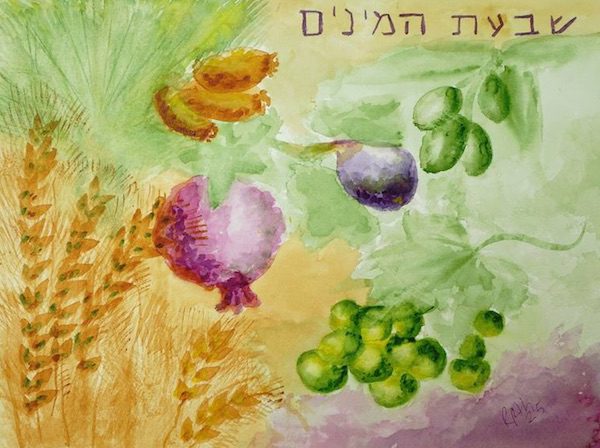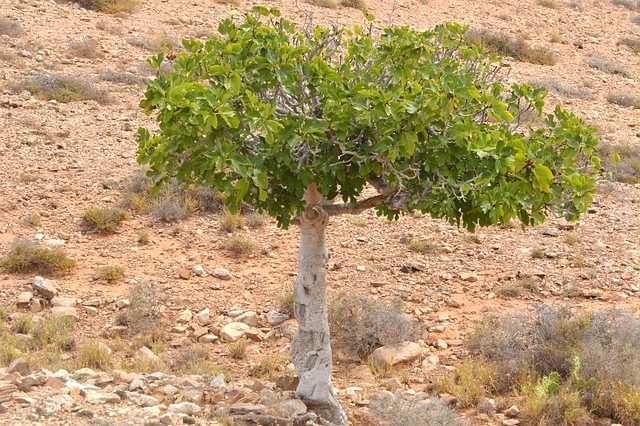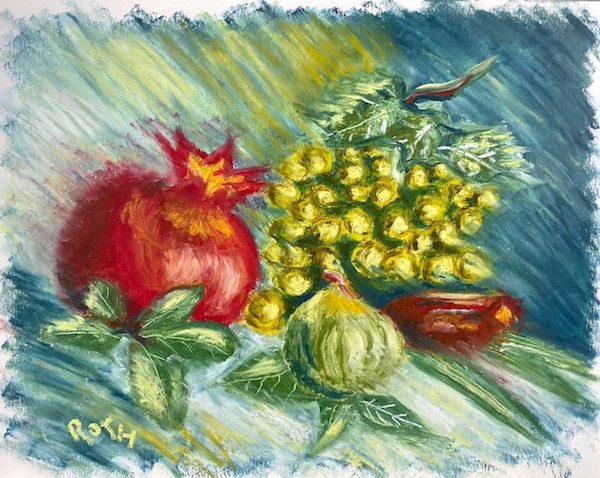Israel is a land rich in history, culture, and culinary delights. Among its many treasures, the seven species of fruits, known in Hebrew as Shiv’at Haminim, hold a special place, both in religious texts and in the hearts of its people. These fruits symbolize the agricultural bounty of the Promised Land and are integral to the celebration of Tu Bishvat, the New Year for trees. The seven species of fruit also have profound spiritual significance. In this post, we explore the 7 fruits of Israel and spirituality.
What are the 7 Fruits of Israel?

The Torah (Deutronemy 8:8) mentions seven fruits for which the land is praised:
1. Wheat
2. Barley
3. Grapes
4. Figs
5. Pomegranates
6. Olives
7. Dates ( literally honey, referring to the honey of dates )
Each fruit has a unique spiritual symbol. These symbols correspond to the characteristics of the human soul, thus giving us strength to adapt these qualities in our lives.
The Spiritual Significance of the 7 Fruits of Israel
Wheat: kindness

Wheat is a staple of our diet. The saying ‘offering someone bread’ is a description of kindness. Sometimes, giving a poor person a good meal is greater than giving money.
Wheat cultivation in Israel dates back to ancient times, with evidence of its growth found in archaeological sites across the region. Ancient Israelites relied heavily on wheat as a fundamental part of their diet.
Wheat takes a variety of forms in the Israeli diet, from challah and pita to matzah.
Barley: constriction, limiting the good

Constriction, meaning limiting goodness, isn’t necessarily bad. For example, rain sometimes comes down in torrents with flooding in its wake. Just the right amount of rain, not too little and not too much, is an aspect of kindness. Thus, bestowing true kindness means holding back some goodness just a little.
Barley cultivation dates back thousands of years. Like wheat, evidence suggests its domestication began in the Fertile Crescent, which includes parts of modern-day Israel. Ancient Israelites relied on barley as a primary food source for their domesticated animals.
Today, barley is mainly a people-food, appearing in recipes like mushroom barley soup and cereals.
Grapes: harmony

Many grapes share space with each other on a vine alluding to harmony between people.
The history of grapes in the land of Israel dates back thousands of years. Grapevines thrived in the Mediterranean climate, and the Torah frequently mentions vineyards and wine.
Grapes are not just a crop; they are woven into the fabric of Jewish culture and tradition. Wine plays a central role in various religious observances, including Shabbat and the Jewish holidays. The act of blessing and consuming wine during these times emphasizes its importance in fostering community and spirituality.
Israel’s wine industry has experienced a remarkable renaissance in recent decades. With over 300 wineries scattered across the country, Israel produces a wide variety of exceptional wines.
Figs: perseverance

Persistence and tenacity describe the fig tree whose lifespan can be more than 100 years. Fig trees thrive in unfriendly, dry climates, like deserts. So too, we develop perseverance in navigating the sometimes unfriendly environment in which we find ourselves.

The Gemara mentions figs in several places, indicating that it was a staple fruit in Biblical times. Figs flourish in the land of Israel today as well. Israel grows several fig varieties, such as the Kadota and the Black Mission. These figs are enjoyed fresh, turned into delicious jams, or dried for a sweet snack.
Pomegranates: humility

A pomegranate growing on a tree looks like it’s upside down. The part we call the ‘top’, or flared out part, faces downward. Similarly, a humble person figuratively bows his head before another, acknowledging that we can learn from every person.
Pomegranates have deep roots in Israeli culture and religion. Often seen as a symbol of righteousness and abundance, they appear in ancient texts and traditions. There’s an old saying, ‘a Jewish person is full of good deeds like a pomegranate is full of seeds‘. There’s even a tradition that says a pomegranate has 613 seeds, the number of mitzvot in the Torah. ( I actually tried counting the seeds in a pomegranate, and when I got up to around 300, I lost count.)
Nutritionally, pomegranates are a powerhouse and prized as a health food. Eaten alone, mixed into a salad, and used in teas, pomegranates appear in a variety of healthy recipes.
Olives: foundation, a hidden source

The foundation, or source, of something is usually hidden. For example, we never see the foundation of a house although we know it’s there. Similarly, the pure oil in an olive is hidden. Only with intense labor is the clear oil extracted. So it is with human nature; sometimes we have to work at revealing our good self to others.
Olive trees are a cornerstone of Israeli agriculture, often described as the “tree of life.” Olive cultivation has existed for millennia in this region, and it plays a significant role in the economy.
Olive oil is known for its health benefits, including heart health and anti-inflammatory properties. In fact, the Mediterranean diet emphasizes olive oil as a primary fat source. Traditional dishes like hummus and various salads feature olives, adding richness and flavor.
Dates: royalty, giving the best

Dates, with their intense sweetness, are a unique and enjoyable fruit. Serving dates symbolizes offering the best of ones resources, treating people like royalty. And indeed, we offer the best of what we have when dealing with, and helping others.
Date palms thrive in Israel’s arid climate, showcasing nature’s incredible adaptability. In fact, Israel is one of the leading producers of dates, especially the Medjool and Deglet Nour varieties. Medjool dates are known for their large size and caramel-like sweetness.
Dates are used in various Israeli desserts, like date-filled cookies or sweet pastries. Their natural sweetness adds depth to dishes while providing a myriad of health benefits, such as high fiber content and essential minerals.
The 7 Fruits of Israel: spiritual treasures for our lives

The seven fruits of Israel, Shiv’at Haminim, not only represent the rich agricultural heritage of the land, but have spiritual symbolism as well. As we celebrate Tu Bishvat by eating these delicious fruits, let’s remember their spiritual meaning and apply it to our lives.
Judaica Art – The History of the Tzedakah Box: Judaica in Art
Discover more from Rhonda Roth Art
Subscribe to get the latest posts sent to your email.